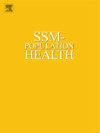童年同伴关系对晚年残疾的长期影响:来自中国老年人的因果中介证据。
IF 3.6
2区 医学
Q1 PUBLIC, ENVIRONMENTAL & OCCUPATIONAL HEALTH
引用次数: 0
摘要
尽管社会关系在中国文化中的重要性得到了认可,但关于童年同伴关系缺失如何影响以后生活健康的研究却很有限。本研究旨在探讨中国老年人童年同伴关系缺失与残疾几率之间的关系,并探讨社会孤立、孤独感和认知功能的潜在中介作用。采用《中国健康与退休纵向研究2013-2018》(N = 7133)中60岁及以上受访者的纵向样本,利用边际结构模型评估童年同伴关系缺陷与晚年残疾之间的联系,并通过反向优势比加权技术检验社会隔离、孤独感和认知功能的潜在中介作用。与童年同伴交往积极的参与者相比,童年同伴关系缺失严重的参与者更容易出现残疾(优势比:1.19,95% CI: 1.09, 1.29)。负比值比加权分析表明,社会孤立、孤独感和认知功能分别在童年同伴关系与残疾的关联中起部分中介作用,分别为11.36% (95% CI: 4.04% ~ 18.99%)、11.95% (95% CI: 4.65% ~ 19.23%)和24.58% (95% CI: 17.01% ~ 32.43%)。三种介质的联合中介效应为30.57% (95% CI: 23.52% ~ 39.91%)。这些发现表明,加强老年人社会联系和认知健康的干预措施可能有助于减轻童年同伴关系缺失对中国老年人残疾的长期影响。本文章由计算机程序翻译,如有差异,请以英文原文为准。
The long-term impact of childhood peer relationships on disability in later life: Causal mediation evidence from older Chinese adults
Despite the recognized importance of social connections in Chinese culture, research on how childhood peer relationship deficits impact health later in life has been limited. This study aimed to investigate the association between childhood peer relationship deficits and the odds of disability among older Chinese adults and to explore the potential mediating roles of social isolation, loneliness, and cognitive function. Using the longitudinal sample of respondents aged 60 years and older in the China Health and Retirement Longitudinal Study 2013–2018 (N = 7133), the link between peer relationship deficits in childhood and disability in late life was assessed using marginal structural models, and the potential mediating effects of social isolation, loneliness, and cognitive function were examined by the inverse odds ratio weighting technique. Participants who experienced greater childhood peer relationship deficits were more prone to disability (odds ratio: 1.19, 95% CI: 1.09, 1.29) than those with more positive childhood peer interactions. The inverse odds ratio weighting analysis indicated that social isolation, loneliness, and cognitive function individually played partial mediating roles in the association between childhood peer relationships and disability by 11.36% (95% CI: 4.04%–18.99%), 11.95 % (95% CI: 4.65%–19.23%), and 24.58% (95% CI: 17.01%–32.43%), respectively. The combined mediation effect of the three mediators was 30.57% (95% CI: 23.52%–39.91%). These findings suggest that interventions to enhance social connections and cognitive health in older adults may help mitigate the long-term impacts of childhood peer relationship deficits on disability among older Chinese adults.
求助全文
通过发布文献求助,成功后即可免费获取论文全文。
去求助
来源期刊

Ssm-Population Health
PUBLIC, ENVIRONMENTAL & OCCUPATIONAL HEALTH-
CiteScore
6.50
自引率
2.10%
发文量
298
审稿时长
101 days
期刊介绍:
SSM - Population Health. The new online only, open access, peer reviewed journal in all areas relating Social Science research to population health. SSM - Population Health shares the same Editors-in Chief and general approach to manuscripts as its sister journal, Social Science & Medicine. The journal takes a broad approach to the field especially welcoming interdisciplinary papers from across the Social Sciences and allied areas. SSM - Population Health offers an alternative outlet for work which might not be considered, or is classed as ''out of scope'' elsewhere, and prioritizes fast peer review and publication to the benefit of authors and readers. The journal welcomes all types of paper from traditional primary research articles, replication studies, short communications, methodological studies, instrument validation, opinion pieces, literature reviews, etc. SSM - Population Health also offers the opportunity to publish special issues or sections to reflect current interest and research in topical or developing areas. The journal fully supports authors wanting to present their research in an innovative fashion though the use of multimedia formats.
 求助内容:
求助内容: 应助结果提醒方式:
应助结果提醒方式:


